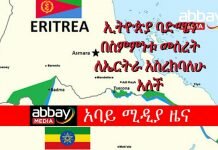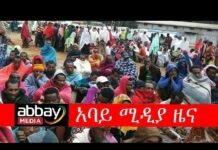 Ethiopia’s flawed model of state and party led and dominated development began immediately after the TPLF dominated ethnic coalition, the EPRDF, took power in 1991. Since then, party, government and state merged and operated seamlessly as the omnipresent and omnipotent one dominating all social, economic, political and even spiritual life. “Revolutionary Democracy and the Developmental State” that Meles Zenawi crafted so beautifully and strategically served the dominant party by enabling it to capture both politics and economics. It enabled elites to capture the entire modern economy.
Ethiopia’s flawed model of state and party led and dominated development began immediately after the TPLF dominated ethnic coalition, the EPRDF, took power in 1991. Since then, party, government and state merged and operated seamlessly as the omnipresent and omnipotent one dominating all social, economic, political and even spiritual life. “Revolutionary Democracy and the Developmental State” that Meles Zenawi crafted so beautifully and strategically served the dominant party by enabling it to capture both politics and economics. It enabled elites to capture the entire modern economy.
Given massive Official Development Aid (ODA) that now exceeds $40 billion, $4 billion per annum over the past few years and billions from the Diaspora and additional billions from Foreign Direct Investment since 2004/2005 when the Chinese entered Ethiopia’s lucrative market, the ruling party embarked upon massive infrastructure investment. Such investment is also a sure way to steal from the public good.
This is the foundation of Ethiopia’s growth. It would have been unthinkable for the governing party to raise Ethiopia’s growth rates each year without massive aid. It would have been unthinkable to raise school enrollment, build colleges and universities in each Kilil, provide broader health services, raise incomes even modestly, create new millionaires, and apparently dollar billionaires, build private villas, skyscrapers and condominiums, build mega projects, including “White Elephants”) and appoint 400 generals in a country that needs only a few, without this unprecedented inflow of capital.
The development model has allowed the capture and concentration of immense wealth by the TPLF, it endowments, loyal supporters and profit seekers at enormous cost to the vast majority of Ethiopia’s 110 million people. This concentration has triggered at least the following:
- Popular resentment and uprising spanning over 13 years, since at least the flawed election of 2005; and culminating in making the current regime illegitimate
- The decimation of Ethiopia’s private sector that is crowded out by party and government enterprises
- Illicit outflow of $ 3 billion per year for several years that is now estimated at $30 to $40 billion
- Diminished public and investor confidence in Ethiopia’s governing elite
- Surrender of Ethiopia’s sovereignty and long term interests
- Inability to match demand of basic goods with supply
- Environmental degradation arising from the misallocation of capital and lack of government oversight in the use of chemicals
- Rising prices
- Hopelessness among Ethiopia’s youth, 70 percent of whom are under the age of 35
- Utter diminution of commercial bank and national bank assets, with the Commercial Bank of Ethiopia alone having leant and lost in excess of 400 billion Birr and
- Foreign exchange shortages and escalating debt levels that pose substantial risks to the Ethiopian economy
These are all systemic, structural and policy linked and cannot be resolved through public decrees and pronouncements. The system that created them in the first place cannot possibly be the cure. Ethiopia must therefore face this stark reality and deal with it going forward.
I grant the TPLF dominated EPRDF kudos for doing its level best to modernize one of the poorest and least developed nations on the planet. Yet, the regime needs to recognize that Ethiopia is still one of the poorest and one of the most corrupt countries in the world. It is at the bottom of 20 of the least wealthy countries in Africa. So, the challenges ahead far exceeds the accomplishments over the past 27 years.
The governing party anchored its modernization model on three pillars: peace, democracy and development. It is easy to propagate these terms as solutions. The fact remains that governing elites are the source of the problem and uttering these terms won’t solve the problems. These same elites who utter the words have never changed their practices. None of them has the courage to say, “Change starts with me.”
Of the three I would give the regime a “C” grade on development and all “Fs” on peace and democracy. As I write this commentary, it is tragic that the Amhara and Oromo people, especially the former are being killed, maimed, degraded and removed from their lands. No single high official has uttered a word concerning this latest well-orchestrated assault.
This leads me to the June 5, 2018 unexpected announcement by Prime Minister Dr. Abiy’s government concerning the privatization or semi-privatization of government or State Owned Enterprises (SOEs). Such enterprises have a well-established history in Ethiopia and in numerous other countries including China, whose development model has been in vogue in Ethiopia. China informed the Financial Times that it is “scaling back its investments in Ethiopia owning to such concerns as bureaucratic inefficiency, taxes and corruption.” It has invested $13 billion.
Not all SOEs are the same. This is why careful study and planning is vital in implementing the program. In the early 1990s, Meles singlehandedly privatized profit making and non-profit making SOEs and facilitated massive transfers of assets from the Ethiopian people to a selected few, most of them Tigrean nationals. EFFORT did not become a $5 billion conglomerate by producing goods and services. Among other things, it hemorrhaged the banking system that is now in a dire situation. This and other monopolies shut out Ethiopia’s private sector making it the least developed in the entire Africa.
For reasons that most readers would discern the TPLF-dominated regime has been inimical to the Ethiopian private sector. Meles was known to call this sector and independent intellectuals and academics “rent-seekers,” a term that is close to greed, bribery, corruption and outright theft. There is a plethora of evidence that rent seeking, underhanded commissions, nepotism, bribery, corruption and illicit outflow of funds bleed any society. They diminish productivity and induce public resentment and outrage. Ethiopian society bleeds as a consequence of these ills. A market economy prevents these excesses and a party and government dominated one exacerbates them willingly and knowingly. Ethiopia deserves a market economy.
The reader will recall the false notion Meles stated over and over again that Ethiopia’s loss of its access to the sea will have minimal impact. Tragically for Ethiopia, Meles opined then that a “port is just like any other commodity. You can create it or buy it.”
Guess what! He is patently wrong. Because Ethiopia is land locked and far away from ports, the cost of Ethiopia’s imports and exports is enormously high. This loss has degraded Ethiopia’s competitiveness. It has also make Ethiopia’s national security untenable. The new Prime Minister needs to give the utmost priority.
The same holds true with regard to the role of the governing party’s lead cohort, the TPLF as a potential creator of wealth and employment for the Ethiopia people. Its dominance has eroded both. It’s secretly and guardedly held assets such as EFFORT must therefore be subject to privatization.
It is therefore a puzzle to me that Prime Minister Dr. Abiy’s government decided to privatize or semi-privatize strategic public assets such Ethiopian Airlines now without public debate.
Other priorities notwithstanding:
The first priority is to retrieve the stolen billions of dollars and to make those who stole them accountable. Future theft, graft and illicit outflow should be criminalized now.
The second is to boost the private sector and make it competitive.
The third is to clean up the rotten and corrupt banking and financial system.
The fourth and supporting institutional mechanism is to issue a regulatory framework that empowers rather than restrains freedom of movement of social and financial capital.
Share distribution must be democratized in such a manner that access is available to the poor and the middle class first; and the rest later.
I know of no successful country that tries to undo harm from poor and corrupt governance by privatizing only. It is institutions that matter most. Otherwise, systemic risk won’t go away.
I therefor pose the following questions to the Prime Minister who I admire.
- Why the urgency?
- Have Ethiopian economists and financial experts within the country been asked to conduct a serious and professional study and come-up with options?
- What is the criteria in selecting strategic public SOEs from others?
- Who would be the primary beneficiary of the privatization scheme?
- What mechanisms have been put in place to ensure that the billions of dollars stolen are not used to buy these assets?
- Who recommended the scheme in light of the disastrous precedents of advice from the World Bank, the IMF, foreign consultants and such personalities as Tony Blair who labeled some African dictators as “Renaissance Men?”
June 6, 2018










































